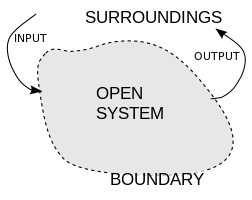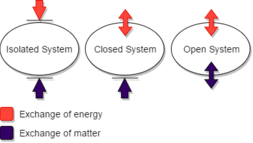Open system (systems theory)
An open system is a system that has external interactions. Such interactions can take the form of information, energy, or material transfers into or out of the system boundary, depending on the discipline which defines the concept. An open system is contrasted with the concept of an isolated system which exchanges neither energy, matter, nor information with its environment. An open system is also known as a flow system.

The concept of an open system was formalized within a framework that enabled one to interrelate the theory of the organism, thermodynamics, and evolutionary theory.[1] This concept was expanded upon with the advent of information theory and subsequently systems theory. Today the concept has its applications in the natural and social sciences.

In the natural sciences an open system is one whose border is permeable to both energy and mass.[2] By contrast, a closed system is permeable to energy but not to matter.
The definition of an open system assumes that there are supplies of energy that cannot be depleted; in practice, this energy is supplied from some source in the surrounding environment, which can be treated as infinite for the purposes of study. One type of open system is the radiant energy system, which receives its energy from solar radiation – an energy source that can be regarded as inexhaustible for all practical purposes.
Social sciences
In the social sciences an open system is a process that exchanges material, energy, people, capital and information with its environment. French/Greek philosopher Kostas Axelos argued that seeing the "world system" as inherently open (though unified) would solve many of the problems in the social sciences, including that of praxis (the relation of knowledge to practice), so that various social scientific disciplines would work together rather than create a monopoly whereby the world appears only sociological, political, historical, or psychological. Axelos argues that theorizing a closed system contributes to making it closed, and is thus a conservative approach.[3] The Althusserian concept of overdetermination (drawing on Sigmund Freud) posits that there are always multiple causes in every event.[4]
David Harvey uses this to argue that when systems such as capitalism enter a phase of crisis, it could happen through one of a number of elements, such as gender roles, the relation to nature/the environment, or crises in accumulation.[5] Looking at the crisis in accumulation, Harvey argues that phenomena such as foreign direct investment, privatization of state-owned resources, and accumulation by dispossession act as necessary outlets when capital has overaccumulated too much in private hands and cannot circulate effectively in the marketplace. He cites the forcible displacement of Mexican and Indian peasants since the 1970s and the Asian and South-East Asian financial crisis of 1997-8, involving "hedge fund raising" of national currencies, as examples of this.[6]
Structural functionalists such as Talcott Parsons and neofunctionalists such as Niklas Luhmann have incorporated system theory to describe society and its components.
Thermodynamics
Systems engineering
See also
- Business process
- Complex system
- Dynamical system
- Glossary of systems theory
- Maximum power principle
- Non-equilibrium thermodynamics
- Open system (computing)
- Open System Environment Reference Model
- Openness
- Open and Closed Systems in Social Science
- Phantom loop
- Thermodynamic system
References
- Luhmann, Niklas. Social Systems. Stanford: Stanford University Press, 1995; pp. 6-7
- Glossary Archived 2007-08-17 at the Wayback Machine Maxwell Demon, 1998.
- Axelos, K. ([2006] 1984). "The World: Being Becoming Totality," from Systematique ouverte (Trans. Gerald Moore, Les Editions de Minuit: Paris). Environment and Planning D: Society and Space, Vol. 24, 643-651.
- Althusser, L. ([2005] 1969). For Marx. London: Verso Books, Ch. 3: "Contradiction and Overdetermination," .
- RSA Animate - David Harvey, The Crises of Capitalism: .
- Harvey, D. (2005). The New Imperialism. New York: Oxford University Press USA, Ch. 3: "Accumulation by Dispossession," 137-182.
Further reading
- Khalil, E.L. (1995). Nonlinear thermodynamics and social science modeling: fad cycles, cultural development and identificational slips. The American Journal of Economics and Sociology, Vol. 54, Issue 4, pp. 423–438.
- Weber, B.H. (1989). Ethical Implications Of The Interface Of Natural And Artificial Systems. Delicate Balance: Technics, Culture and Consequences: Conference Proceedings for the Institute of Electrical and Electronic Engineers.
External links
- OPEN SYSTEM, Principia Cybernetica Web, 2007.